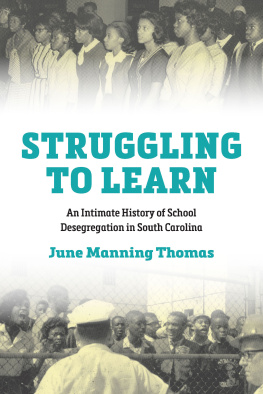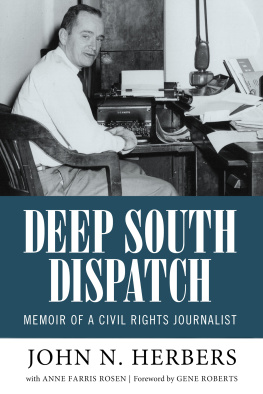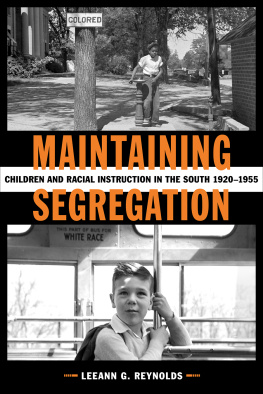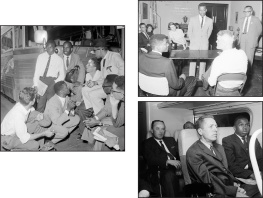Dedicated to my children, grandchildren, and great-grandchildren.
My legacy to you is the discovery of your lineage. Continue the journey of life, love, and family. Endure the hardships, and embrace the future. Judge not the ethnicity of the person, but scrutinize the character.
I love each of you. God bless all of you.
my cousin, Calvin Franklin Burton.
I ALWAYS THOUGHT I had a fairly normal childhood, until I found out my parents werent who I thought they were. I grew up in Coatesville, Pennsylvania, a small town in the hills along the Brandywine River on the threshold of the rich farmland of the Amish country. We were only forty miles from Philadelphia, and the main line of the Pennsylvania Railroad ran through our town. And yet Philadelphia might as well have been the moon. That was the Big City. Coatesville was nowhere, but for a little girl it was everywhereit was all I had and all I knew. Coatesville was what was considered a one-horse town, but that horse was a very powerful steed called steel. The Lukens Steel Company dominated everything about our town. Its dozens of soaring smokestacks dominated the skyline. They were our own skyscrapers. Even the smoke belching from those enormous stacks was a point of pride, not pollution. That pungent, thick, black soot meant the mills were working full blast, that the little town was booming. It was the smell of money.
Like most men in Coatesville, my father, John Henry Washington, worked for the steel mills. Bethlehem Steel and Worth Brothers Steel had huge plants in Coatesville, but the colossus was Lukens Steel. Like an industrial octopus, Lukens had devoured its rivals and made them its own. The matriarch of the business was a legendary local character named Rebecca Lukens, known as The Woman of Steel. She was an independent woman, far ahead of her time, a Pennsylvania version of a steel magnolia. Rebecca was the driving force behind the expansion of her familys Brandywine Iron Works into an international powerhouse. She was one of the first women in America to run a major company, and her daughter married a man named Huston. When I was growing up, the Hustons were Coatesvilles first family. They lived in a grand manor house called Terracina and were to Coatesville what the Kennedys or the Rockefellers are to America. Despite the small size of the town (15,000 people), I never met a Huston, and, by the same token, I never aspired to become a woman of steel. American women today have those sort of huge have it all ambitions, but growing up black during the Great Depression, I was perfectly happy to dream about becoming a nurse. That was a pretty big deal at the time, and I was more ambitious than most.
My mother, or at least the woman who I thought was my mother, kept house, while daddy worked on the assembly line. Mother had worked as a picker in the cotton fields of South Carolina and said that was enough hard labor for two lifetimes. I had a half-brother, Calvin Burton, who was my mothers son by a previous relationship, which I later learned was not an actual marriage. Calvin was seven years older than I, and by the time I was thirteen, in 1938, he had left home to live in New York City. I had fantasies of following him there, to become a nurse in a big city hospital, but these were only fantasies. At thirteen, I still hadnt gotten to Philadelphia.
We lived in a small, two-story, three-bedroom row house in a neighborhood called The Spruces, named after the tree, which was populated by other black steelworkers. Most of them, like my family, hailed from the South. I had my own room, which seemed like a castle to me. The house was heated with coal stoves, and there was no running water or any bathrooms. We had to use an outhouse in the back and take tub baths in the bedroom using water wed carry from an outside pump. It sounds primitive, but it seemed normal then, although the winters were awfully cold, and the day of the week the big sanitation trucks would come to clean the outhouses was the smelliest day you could imagine. Wed all try to stay away from home on that day. I remember visiting the home of a white girlfriend. The house wasnt any nicer than ours, but it did have an indoor toilet. It seemed like the ultimate in high technology at the time.
Ill never forget the wonderful dinners wed have: fried chicken, biscuits, lots of fresh vegetables, and the sweetest pies made with local peaches, strawberries, apples, and plums. Every night was like Thanksgiving. My mother, who was tall and slim and a great cook, always wore a kerchief around her head. That seemed old-fashioned at the time, as did her habit of chewing tobacco and expelling it into a spittoon. I gathered that it was an old southern custom shed brought with her. I didnt question her about it. In fact, I didnt tend to question things at all. My parents were of the children should be seen and not heard school. As a little girl I started out quite chatty, but one day my mother warned me that mouth of yours can get you into trouble, after which I learned to keep it shut.
We never talked much at those fine dinners, partly because we were all listening to the radio all through the meal. That was our ear to the world. Despite all the bad news that seemed to be coming through the airwavesthe seemingly endless Depression, the rise of the Nazis in Europe, disasters like the Hindenburg airship explosionthe feeling around the table was very positive. My father, a handsome man who always came to the table after a hard, dusty day at the mills immaculate and smelling deliciously of soap and cologne, always said a blessing of thanks, for the food, for his job, for his wonderful family, and for funny or odd things, like Shirley Temple, or Charlie Chan, or Heinz ketchup. And then wed listen to comedy shows like Edgar Bergen and his puppet Charlie McCarthy or the big band music of Benny Goodman. There wasnt much need to talk; the radio said it all.
And then came 1938a big year for me for a lot of reasons. First of all, my parents got divorced. My father, apparently, was not only a hard worker but also a hard drinker, haunting the many taverns of our town, rarely during the week but frequently on weekends. Steelworking and hard drinking seemed to go hand in hand. Prohibition had ended in a big way, and there was a bar or whiskey house on every corner, many of which seemed to have been frequented by my father. There were no problems at home that I ever noticed, but there must have been plenty. One day, daddy was gone, and I never saw or spoke to him again. In keeping with my mothers philosophy of the fewer questions, the better, I never asked her about my fathers departure, much as I would have loved to do so. Nor did she sit me down for a heart-to-heart about why he left. He was gone, and that was that. I missed the confident, comforting masculine presence of my father. He made me feel safe in an increasingly turbulent world. I felt lost without him but learned to keep that kind of emotion deeply to myself, and eventually the pain died down.







